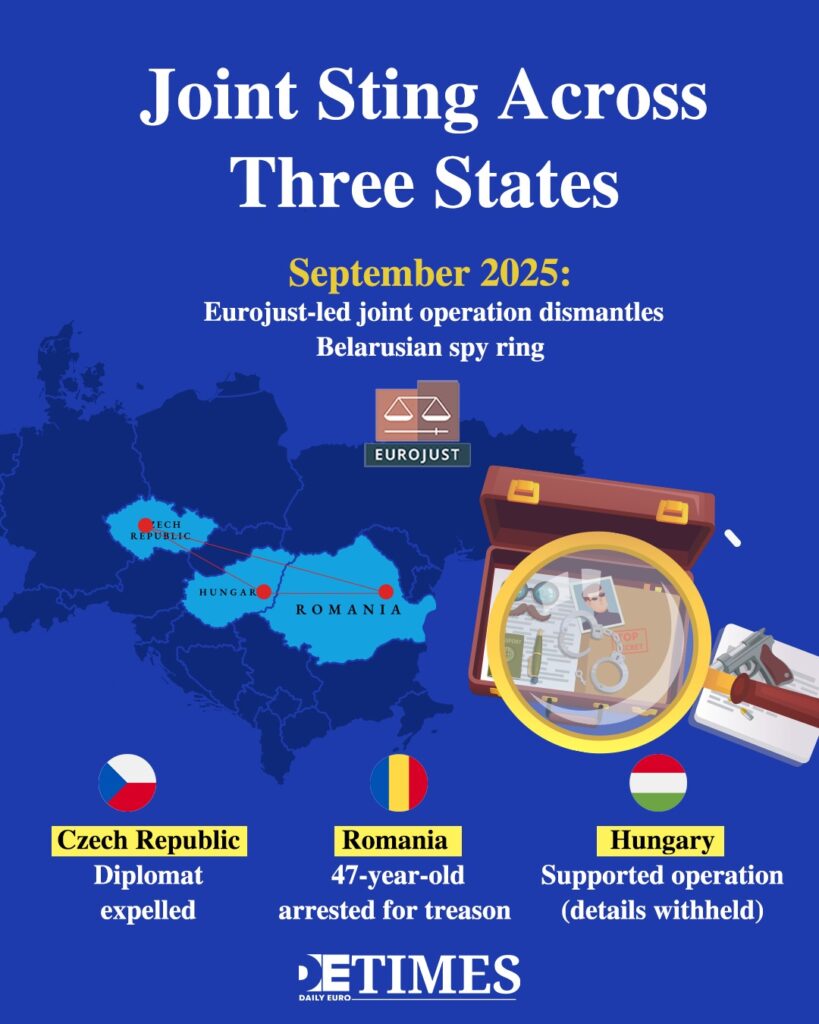In September 2025, the Czech Republic, Romania, and Hungary jointly dismantled a Belarusian intelligence network operating in Europe.
The operation, coordinated by the Eurojust agency, exposed the activities of agents linked to the Belarusian State Security Committee (KGB) and led to the arrests and expulsion of diplomats.
International Coordination and Intelligence Operations
The Czech Security and Information Service (BIS) reported that KGB agents, under diplomatic cover, were identified as part of the operation.
A former deputy head of the Moldovan intelligence and security service was arrested; according to investigators, the agent passed classified information to Belarusian operators during meetings in Budapest. The Czech Republic declared one of the employees of the Belarusian embassy persona non grata, accusing him of using his diplomatic status for intelligence activities.
Romania also took part in the operation, arresting a 47-year-old suspect on charges of treason.
Investigators found that he met with Belarusian operators in Budapest twice between 2024 and 2025, where he passed on state secrets for a fee. Hungary, although it supported the operation, did not provide details of its actions in dismantling the network.
History of Belarusian Intelligence Activities
Belarusian intelligence, led by the Belarusian KGB is active in Europe, using diplomatic missions as cover.
The KGB of Belarus, the successor to the Soviet KGB, continues the traditions of Soviet intelligence, operating actively in the EU. Using diplomatic channels, Belarus collects intelligence information, as evidenced by recent revelations and expulsions of diplomats.
These events highlight the need for greater control over diplomatic missions and stronger international security cooperation to counter intelligence threats.

Methods of Operation of Belarusian Intelligence Networks in Europe
The Belarusian KGB actively uses diplomatic missions, business contacts, and technological channels to collect intelligence information in Europe. Undercover diplomats often act as intelligence officers, establishing contacts with local politicians and businessmen. Through business structures, the KGB gains access to economic and technological information and also uses them to recruit agents.
Technological channels, including cyber espionage, supports data collection on scientific and defense developments. Covert communication is carried out through encrypted messages, secret meetings, and the use of “illegals”: agents operating under false identities.
Belarus’ Reaction and Diplomatic Fallout
In response to the Czech Republic’s actions, Belarus expressed strong protest, calling the diplomat’s expulsion unfounded and politically motivated.
The Belarusian Foreign Ministry warned of possible retaliatory measures and stressed that such steps undermine efforts to improve bilateral relations.
Earlier, on the 8 September, Polish Prime Minister Donald Tusk announced the arrest of a Belarusian spy and plans to expel another diplomat accused of supporting hostile actions against Poland. Tusk also announced the closure of the Polish border with Belarus citing joint military exercises between Russia and Belarus.
The Operation, Significance, and Next Steps
The successful exposure of the Belarusian spy network emphasises the need for tighter intelligence sharing across European states to counter hostile statecraft by foreign agents.
The operation, coordinated by the Eurojust agency, demonstrated the ability of European intelligence agencies to effectively cooperate in joint investigations, which is a key element in countering transnational threats.
The incident also highlighted the need to strengthen control over diplomatic missions and pay increased attention to possible threats from countries that support an aggressive foreign policy.
In particular, the head of the BIS, Michail Koudelka, noted that the freedom of movement of diplomats from Russia and Belarus in the Schengen area contributes to the expansion of spy networks and proposed restricting their movement to improve security.
Future steps are likely to include more monitoring, counter intelligence activities, and long-term revisions on the freedom of movement of Belarussian and Russian citizens across Schengen.
Read the Latest Articles on DET!
I Need My Labubu: Wang Ning’s Billion Dollar Toy
Suez on Rails: China is Changing the Map
Plucked Out of Thin Air? How Meteorologists Name Storms





